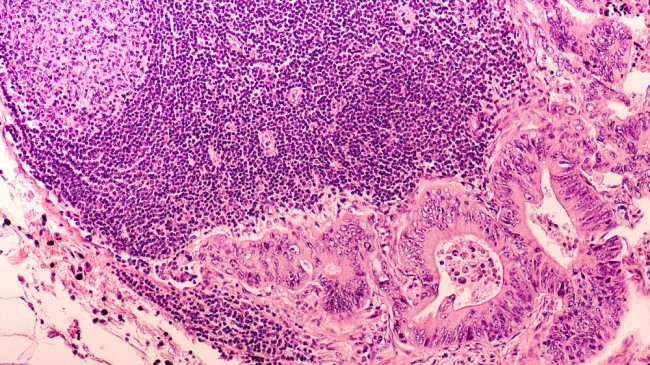£5.5m research funding to transform bowel cancer care
Published: 31 March 2025
European clinicians and scientists are to receive £5.5m in funding to form a world-leading research team tasked with making personalised medicine a reality for people with bowel cancer
European clinicians and scientists are to receive £5.5m in funding to form a world-leading research team tasked with making personalised medicine a reality for people with bowel cancer.
The CRC-STARS (Colorectal Cancer - Stratification of Therapies through Adaptive Responses) initiative will bring together 40 research experts from across the UK, Spain, Italy and Belgium to find kinder, better treatments for the disease, which kills 16,800 people in the UK every year. Joining forces will enable them to use their combined expertise across multiple research areas, and pair clinical trial data with cutting-edge technology.

Bowel cancer, also known as colorectal cancer, is the second most common cause of cancer deaths in the UK. Despite this, treatment options remain limited, particularly for patients who are diagnosed at later stages of the disease.
CRC-STARS is jointly funded by Cancer Research UK (£2m), the Bowelbabe Fund for Cancer Research UK (£2m), philanthropic support from Bjorn Saven CBE and Inger Saven (£1m), and the Scientific Foundation of the Spanish Association Against Cancer (FCAECC, €600,000 [~£500,000]).
The CRC-STARS team will be co-led by Professor Owen Sansom, Director of Cancer Research UK Scotland Institute, which is based at the University of Glasgow, alongside Professor Jenny Seligmann (University of Leeds) and Professor Simon Leedham (University of Oxford). The team also includes experts from the University of Glasgow School of Cancer Sciences Professor Crispin Miller, Professor Joanne Edwards and Professor Campbell Roxburgh.
Chief Executive of Cancer Research UK, Michelle Mitchell, said: ““For over 100 years, Cancer Research UK-funded scientists have been working to beat bowel cancer, and this project is one of the most comprehensive for bowel cancer that we have ever supported.
“Together with our funding partners – the Bowelbabe Fund, Bjorn and Inger Saven and the FCAECC – we can empower the CRC-STARS team to speed up the development of personalised treatment for people living with bowel cancer, bringing us closer to a world where people live longer, better lives, free from the fear of cancer.”
The team of researchers will build on the tools, resources and discoveries developed by existing bowel cancer research collaborations and Cancer Research UK’s National Biomarker Centre. They will also analyse data from colorectal cancer studies such as the University of Glasgow/NHS Greater Glasgow & Clyde-led PRIME-RT clinical trial, and the FOxTROT and TREC trials.
The researchers aim to better understand how different bowel cancers respond to current treatments, why certain bowel cancers spread, and whether they can predict which treatments will work for individual patients.
Personalised medicine involves using detailed information about a person’s cancer – not just the part of the body where the cancer started - to help with decisions about diagnosis and treatment.
While some patients are already benefitting from this type of treatment, such as people with certain types of breast cancer, it is an area still very much in development. The CRC-STARS team will work together to learn even more about how bowel cancer behaves so that it can potentially be treated in a more personalised way in the future.
Director of the Cancer Research UK Scotland Institute and CRC-STARS research co-lead, Professor Owen Sansom, said: “Step by step, day by day, we’re discovering new ways to prevent, detect and treat bowel cancer and save lives. The support we’ve received from our funders will allow us to take bold steps towards better understanding bowel cancer and how to beat it.”
Professor Campbell Roxburgh, Professor of Colorectal Surgical Oncology at the University of Glasgow and lead investigator on the PRIME-RT trial, said: “‘We are delighted to support the fantastic CRC Stars consortium here in the School of Cancer Sciences at the University of Glasgow. This exciting programme of work brings together state of the art discovery science and expertise from across the UK and Europe. We are planning to study samples collected from modern clinical trials in colorectal cancer here in the UK, including our own PRIME RT rectal cancer trial, developed in Glasgow.
“We are extremely grateful to the patients in the trials who allowed extra biopsy samples to be taken for these research purposes. This research will add significantly to the results from these important trials, and we will be able to learn why some patients respond better than others. This exciting research will ultimately support the development of new treatments for a more individualised approach to colorectal cancer treatment.”
The Bowelbabe Fund for Cancer Research UK was set up to continue the inspiring legacy of Dame Deborah James who was diagnosed with bowel cancer in 2016 at the age of 35. Launched in the last few weeks of her life and now stewarded by her family, together with Cancer Research UK, it works to fund cutting-edge research, raise awareness of signs and symptoms of cancer with the aim of helping give more people affected by cancer more time with the people they love.
Additional financial support for CRC-STARS includes a £1m commitment from Bjorn Saven CBE and Inger Saven. Bjorn is an industrialist, investor, philanthropist and Cancer Research UK supporter. Inger is a Trustee of The Mentor Foundation, an international non-profit development organization working to help young people find a path towards a promising future.
The FCAECC is also contributing €600,000 (~£500,000) to specifically support the work of the researchers based in Spain. The team of researchers will work on combining experimental, pre-clinical and clinical data to predict cancer progression and tailor new therapeutic approaches specific to each patient's characteristics. The aim is to prevent the development of drug resistance and improve the response to treatments such as chemotherapy and immunotherapy, hopefully improving the effectiveness of colorectal cancer treatments.
Enquiries: ali.howard@glasgow.ac.uk or elizabeth.mcmeekin@glasgow.ac.uk
First published: 31 March 2025

